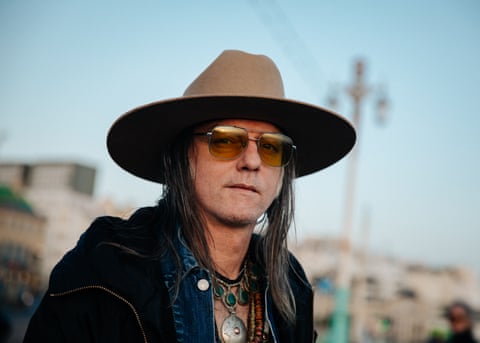Over more than 30 years, the Brian Jonestown Massacre have garnered a reputation like that of few other bands. The San Francisco group, led by Anton Newcombe, are known for their fecund creativity, violent volatility, chaos and magic – all of which are woven together to create music spanning psychedelia, shoegaze, country and garage rock. I have joined them for part of their UK tour. “Stop putting off a genius, you cocksucking dickhead!” yells Newcombe to a heckler during one of many guitar-tuning breaks in Brighton. “Go fuck yourself!” he spits to another.
Much of their reputation was cemented in the 2004 documentary Dig!, in which Newcombe delivered lines such as: “You fucking broke my sitar, motherfucker,” after an onstage brawl with his own band. The film is a maelstrom of drama, addiction, blown opportunities and a friendship turned rivalry with the Dandy Warhols.
The Dandy Warhols frontman, Courtney Taylor-Taylor, is the film’s narrator. He describes Newcombe as “the most craziest and talented musician I have ever met”. Of the band, he adds: “I’ve never seen them eat. All I’ve seen them do is drink liquor and snort drugs.”
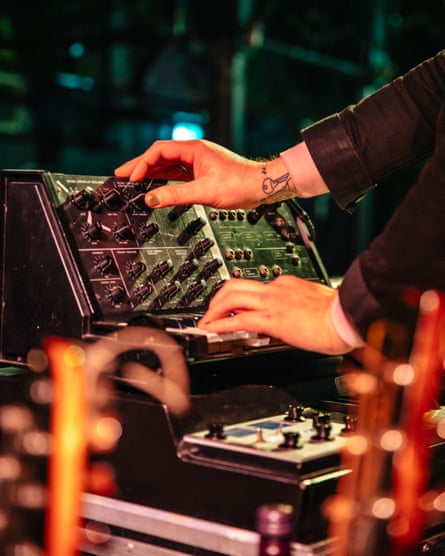


Setting up for a show in Brighton.
Almost 20 years on, a few days before the release of the band’s 20th album, Your Future Is Your Past, the vibe backstage at a BJM show is more hummus than heroin. Newcombe kicked his habit many years ago. He describes quitting as “like running a marathon with the flu and then having Bruce Lee kick you in the chest”.
Today, Newcombe sips vodka sodas slowly and hurtles through packs of filterless cigarettes, on which he puffs as we walk from the soundcheck to the tour bus in Bristol. He is dressed in pyjamas, slippers and a Stetson, staying in this outfit until showtime, when he swaps the nightwear for denim, has a quick armpit wash in the tour bus sink, pulls on his cowboy boots, adds mounds of dangling jewellery and dabs on patchouli oil.
At 55, Newcombe has done what few expected of him – survive – and what even fewer thought possible – thrive. BJM are a self-sufficient outfit: they run their own label and studio, own their back catalogue and sell out their shows with ease. Despite being a cult band since their formation in 1990, their appeal has trickled down through generations. The crowd in Bristol is a sea of pogoing twentysomethings singing every word. Anemone, a cut from 1996, has become an unexpected hit, racking up nearly 80m streams on Spotify alone. Despite its slow-burn groove, it goes off like a bomb when they play it live. It was a favourite of Anthony Bourdain, who invited Newcombe to be in the Berlin episode of his TV show Parts Unknown. “Drenched in opiates and regret, I heard this song once and became besotted by it,” Bourdain once told Rolling Stone.
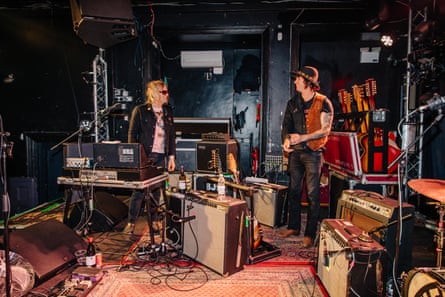
The band’s Ryan Carlson Van Kriedt (left) and guitar tech Shea Roberts prep for sound check.
It’s one of very few concessions to the past the band make live; mostly, they choose to play new material. “Some bands are happy to resign themselves to playing the hits, but that’s not me,” Newcombe says.
On the bus, Newcombe shows me his favourite bar-fight move: deliberately dropping his glass on the floor, causing the aggravator to look down, “then bam”, throwing his fist down. But Newcombe says he is done with bar brawls – even though someone threw a lit candle at him recently after an argument. “I don’t go to bars, because people want to provoke me and pick fights,” he says. “I see red. My natural tendency is to want to grab people by the throat and not stop. I can’t control how I react and nobody deserves what I am capable of unleashing just because they said something stupid. I’m much happier cooking and making music.”

Joel Gion and Anton Newcombe backstage.
Despite seemingly being a magnet for drama, one on one, Newcombe is welcoming and softly spoken. In Falmouth, we sit quietly and talk as the rest of the band disappear to a house party with some fans. They return at 6am; the tambourine player, Joel Gion, sleeps through the 5pm soundcheck later that day. “Oh man,” he says. “I fell out of my bunk while sleeping and didn’t even wake up.” He points to a badge he has sewn on to his bag that reads “Bushido” – literally, the way of the warrior, the moral code of the samurai rooted in discipline, loyalty and other virtues. “To remind myself not to get too fucked up on tour,” he says, laughing.
Gion has written a memoir, a task he says was assisted by the high-quality amphetamines he used to take in San Francisco. “That provided me with a memory sharpness,” he says. “I was able to remember far more than I expected.”
Is this the same speed given to Oasis on their first US tour, as documented in the 2016 documentary Supersonic, which caused Noel Gallagher to go missing and the band to break up briefly? “That’s it, baby! Ninja speed, Noel called it.”
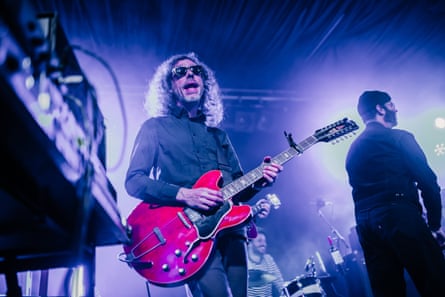
Guitarist Ricky Maymi.
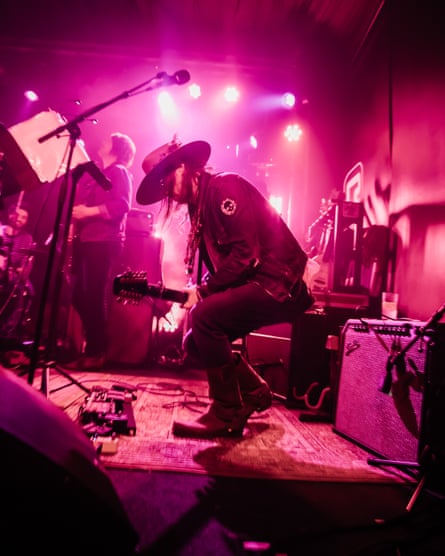

Newcombe and Gion on stage.
BJM were the support band at one show back then. “I knocked on the tour bus and Noel answered. I’m like: ‘Hey man, I have most righteous fucking crystal meth that you’re ever going to do,’” Gion recalls. Noel passed, but Liam was up for it; the substance was soon liberally distributed among the band. “They do all these coke-sized lines of this shit that you just need a little pinky of,” he says. “They stayed up for three days. On stage, they were just gone. Their jaws were working like old-fashioned train crankshafts.”
There is love in the band, but also palpable tension. On stage, Newcombe stops songs and lambasts members, declaring their playing to be “shitty” and “sloppy”. “Sometimes you gotta crack the whip – you’re only as good as your weakest link,” he says after a testy exchange in Brighton, before making an analogy of Ronaldo (himself) playing on a team of six-year-olds (the rest of the band).
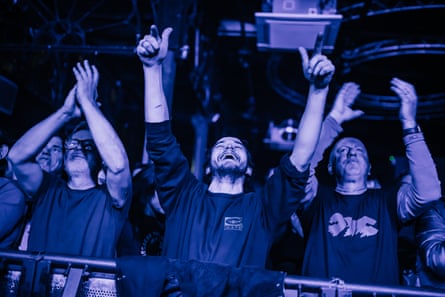
Fans in Brighton pay homage.
It can create visible unease on stage – it’s like watching a storm cloud, waiting for thunder to crack. Sometimes the thunder is Newcombe’s ire; at others it’s the sound of a band locked into ferocious, immersive grooves. At their best, the band are mesmerising. But the constant stopping can kill the show’s momentum. “I have perfect pitch and it really bugs me,” Newcombe says, as we zigzag the streets of Brighton looking for hippy shops in which to buy more jewellery, before settling in a bar. “It’s better to stop a song in the first seconds and play it correctly than to play some bullshit for hours. The Rolling Stones do it every single concert – they sound nothing like the record.”
Newcombe gives off the aura of someone who feels he has beaten the system. “I’ve got a better deal than anybody in the world,” he says. “You don’t need validation from other people.”
As we toast to good health with a shot of Grey Goose, I ask if he feels that people hold misconceptions about him. “I’ve got this wild reputation,” he says. “But I’ve found it advantageous that people underestimate your intelligence.” Newcombe is apparently contradictory in this area. He is prone to bursts of boastful proclamations: “I’m a fucking genius, like one of these Mozart guys,” he says one minute, before offering: “I’m not saying I’m so great, or I cured polio, or whatever.”

The Brian Jonestown Massacre.
He is consistent in his fervent dedication to forging his own path. “I knew from being very young that I didn’t want to be like anybody that I knew,” he says. “I noticed people were just generally unhappy because they weren’t doing what they wanted to do. I decided I’m never going to be that person. Do what you want, it’s fine to be yourself. All the way you.”
The band briefly danced with record labels in the 1990s. “It went to shit,” says Gion. Newcombe says circumventing – and in some instances tormenting – the industry was a tactic. “I thought since everybody says yes, I’ll just say no,” he says. “It’s counterintuitive, but smart.”
This has led to accusations of self-sabotage. “Everyone’s like: ‘Oh, he throws it all away,’” he begins. “But the postscript of Dig! is that the whole industry collapsed. All the king’s horses and men, they’re gone. None of those people in that movie have a job in the business. People make me out to be a loser when I’m not.”
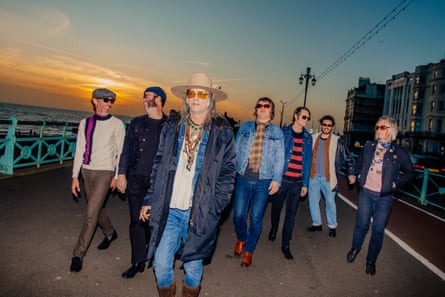
Taking a stroll on the prom.
That said, it’s clear he would like a taste of some of that world. “I would love to do Jools Holland,” he says. “I watch all the shit on there and laugh, because I could play 50 songs in a row that are better. Even if I could summon up enough composure to stand there and just be deadpan, it would be more intellectually stimulating, artistically relevant or historically fucking important.”
In the opening scene of Dig!, shot in 1995, a young Newcombe leans into the lens of a camera with wild, glaring eyes and declares: “I’m going to destroy this fucked up system. Let’s burn it to the ground.”
So, did he do it? He leans over, those same eyes staring at me through yellow sunglasses, the whiff of patchouli ever present. “That’s just what I did.”
